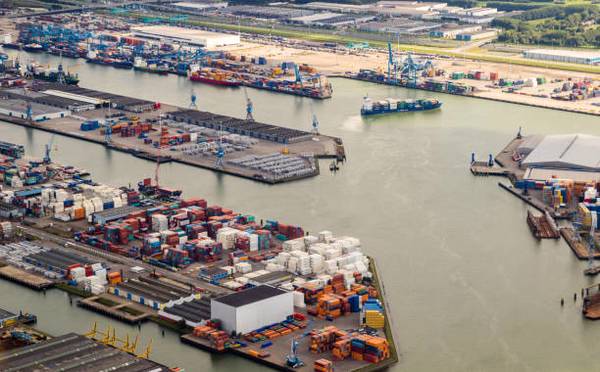Rotterdam, Singapore and partners pledge 20-30% shipping emission cut by 2030
The pledge was made at the third ‘Green and Digital Shipping Corridor’ workshop held in Rotterdam this week, said the port authorities.
 PHOTO: Aerial view of Port of Rotterdam in the Netherlands. Getty Images
PHOTO: Aerial view of Port of Rotterdam in the Netherlands. Getty Images
The Port of Rotterdam Authority, the Maritime and Port Authority of Singapore (MPA) and 20 green corridor partners have vowed to reduce 20% to 30% of global shipping emissions by 2030, compared to 2022.
The Port of Rotterdam said that the corridor will work towards the International Maritime Organisation's (IMO) revised greenhouse gas (GHG) emission reduction goals by using zero or near-zero emission fuels “like synthetic and bio-variants of methanol, ammonia and LNG." They target uptake from large container ships (at least 8,000 TEU) on the 15,000 km route, alongside operational and digital improvements.
The corridor has garnered support from shipping companies, port authorities, fuel suppliers, banks, higher learning institutes and knowledge partners since it was conceptualised a year ago, Port of Rotterdam added.
Currently, members of the corridor project are aggregating demand and supply to minimise the cost gap between conventional and alternative fuels, Rotterdam's port authority said. The members are looking into “deployment of all of these fuels on the trade lane, spanning across demand and supply of fuel, standards, safety procedures, financing, and regulations,” it added.
A separate working group has also been established to study “modeling price-gap differences to incentivise the uptake of alternative fuels,” the port authorities announced.
“The partners believe that the corridor’s approach, supported by the strong industry coalition will provide greater certainty in demand and help scale-up production of zero and near-zero emission fuels,” Port of Rotterdam said.
Among the 20 green and digital shipping corridor partners who have joined forces with the MPA and Port of Rotterdam include shipping major A.P. Moller Maersk, oil and gas majors BP and Shell, the Centre for Maritime Studies of the National University of Singapore, Citi Bank, Mærsk Mc-Kinney Møller Center for Zero-Carbon Shipping, SEA-LNG and the University of Oxford.
By Aparupa Mazumder
Please get in touch with comments or additional info to news@engine.online






